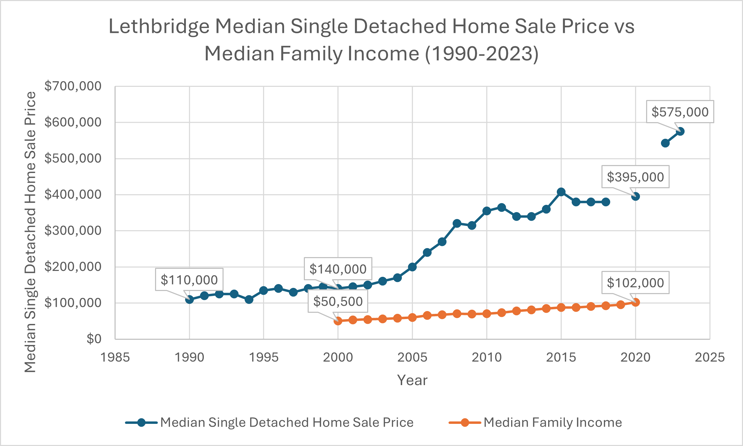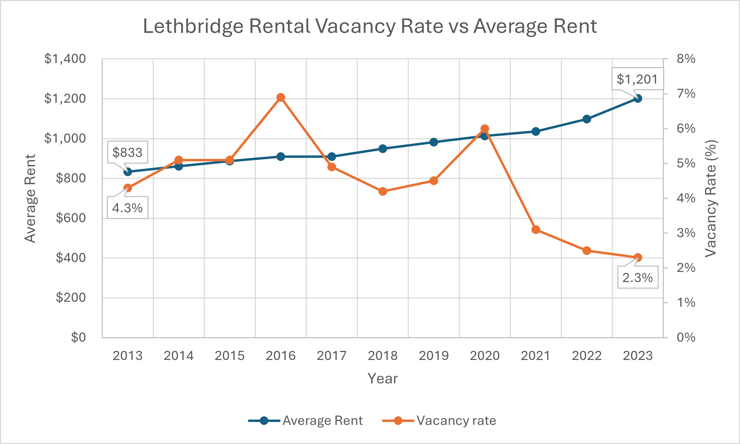Why is more housing needed?
There have been some questions in the community regarding several recent rezoning application approvals, specifically a couple of housing projects in and adjacent to the London Road neighbourhood.
We wanted to help clarify some of these questions, outline the processes that were followed and the many factors City Council considers in their decision making.
At its meeting on January 21, Lethbridge City Council approved several Land Use Bylaw Amendments and Area Redevelopment Plan Amendments for four different proposed housing projects on the city’s southside, including two on 13 Street South just north of 6 Avenue South. These items were in follow-up to the lengthy Public Hearings on December 10.
Q: What exactly is going to be built?
A: Sumus Property Group has proposed a development on the east and west side of the 500 block of 13 St. S., to build close to 50 apartments units on each side of the street with the potential of adding some commercial space.
To do this, they had to apply to amend the London Road Area Redevelopment Plan allowing an increase in the maximum building height allowed. Additionally, the Land Use Bylaw was amended to rezone the parcels to allows redevelopment.
Q: Why is this project going into the established London Road area?
A: There are six parcels on 13 Street South that have been vacant since the former derelict properties were torn down in 2022. There have been numerous redevelopment inquiries since then, culminating with a development proposal from Sumus. The application by Sumus to amend the London Road Area Redevelopment Plan was in full compliance with the process – as outlined and allowed by the Province’s Municipal Government Act (MGA).
Public Hearings were held, and community feedback was considered as one element of the City Council’s decision-making process.
Q: At the Public Hearing, I spoke against the project – so why is it going ahead?
A: Public hearings are your chance to share your opinions and views on specific topics with City Council. These hearings are open for anyone to speak at or to submit written comments. This feedback is one facet of the decision-making process. With any potential rezoning requests, Council considers several different avenues, including higher level statutory plans such as the Municipal Development Plan, Administrative reports and recommendations, applicant presentations, as well as any discussions and public submissions made at a Public Hearing.
As per an MGA mandate, rezoning and statutory plan amendment requests always go to Public Hearings. City Council also must consider the needs of the greater community and make decisions that will progress our city in a safe and healthy way.
Q: Why does Lethbridge need more housing?
A: The cost of housing relative to household incomes has increased during the past few decades. Whereas homeownership was a more attainable goal in Canada in 1980 (at three times the average income), the current gap is widening, with the average price of a home in 2021 growing to more than seven times the average income.

Q: What are the current challenges for rental units?
A: As shown in the figure below, Lethbridge rental prices have also increased sharply in recent years as vacancies have fallen. Average rent increased 44.2 per cent from 2013-2023, while the vacancy rate fell from 4.3 per cent to 2.3 per cent.

Q: Will other established neighbourhoods be affected by future rezoning applications?
A: According to the Province’s MGA, anyone may apply to rezone or to amend a statutory plan (such as an Area Redevelopment Plan) and those applications must be given a Public Hearing. This has been the case for many decades. However, the pace of change in Lethbridge is typically much lower than in larger cities such as Calgary, due to many factors such as land values and population growth rates.
Lethbridge’s Municipal Development Plan calls for a balance of building new neighbourhoods on the city fringe as well as accommodating ‘infill’ development in appropriate locations within existing neighbourhoods. Infill development has several benefits to the community, as it uses existing infrastructure (e.g. roads, pipes, wires), and potentially results in less road congestion versus building on the edge of the city.
Q: What can I do to provide input for the future of Lethbridge?
A: The City of Lethbridge is renewing its Land Use Bylaw (LUB), which has served our community since 1986. This is the DNA of our city, controlling what kinds of buildings we can put where, how tall they can be, parking requirements etc. It guides how we grow and develop into the future. The goal is to create a document that is more user-friendly, less restrictive and for it to shape the kind of communities in which Lethbridge residents want to live, visit and do business.
We are now in phase two of this project, exploring residential, commercial and industrial uses and districts, as well as parking requirements and other related regulations. Until February 18, residents can contribute their feedback via the phase two online survey. Phase one of the project explored social uses and was completed in early 2024. We will have further engagement opportunities in the coming months. Keep up to date at https://getinvolvedlethbridge.ca/lub.
Q: Where can I find more information regarding rezoning applications and Public Hearing notices?
A: Upcoming Public Hearings are advertised in the Lethbridge Herald and online. We have a variety of pages on our website, including:
- Planning and Development Applications | City of Lethbridge
- Public Notices and Hearings | City of Lethbridge (which includes Public Hearing FAQs)
Public Hearing notification letters are also mailed to all properties within 60 metres of the subject parcels.
Contact Us
City Hall
910 4 Avenue South
Lethbridge, AB T1J 0P6
Phone: 311
or 403-320-3111 (if outside of Lethbridge)
